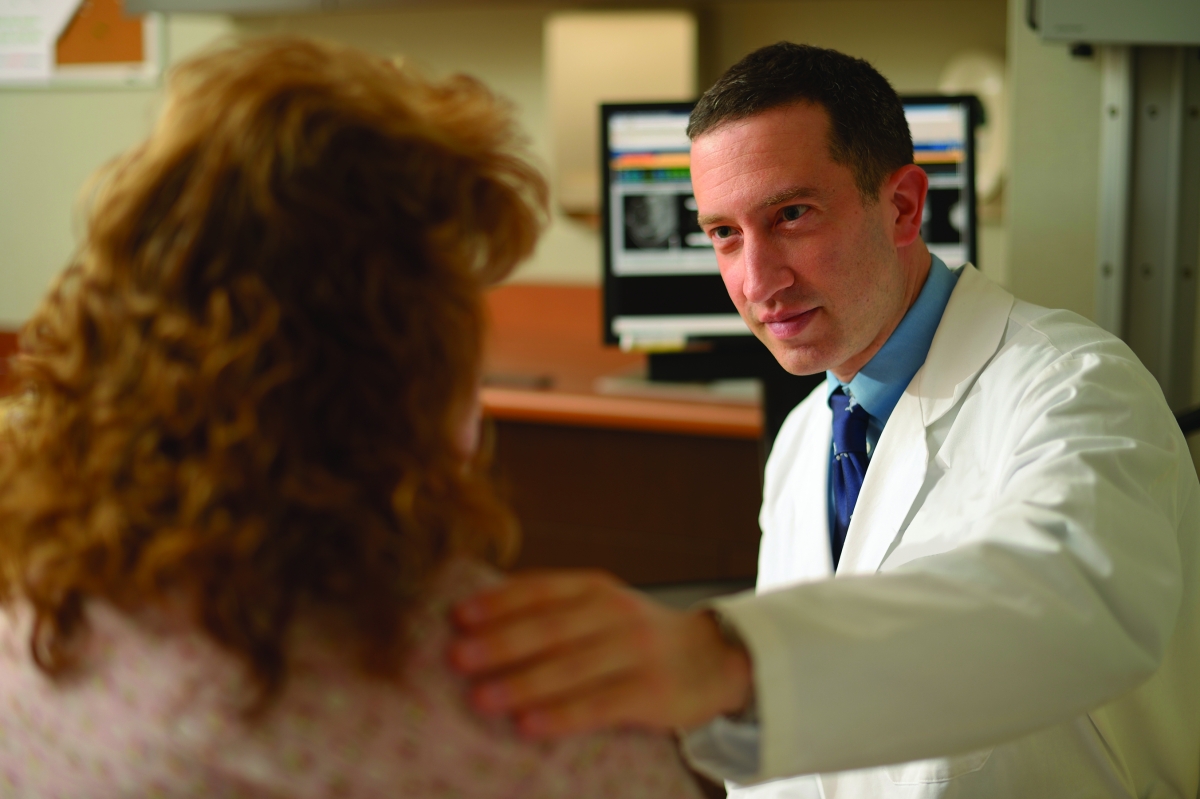
An Intimate Look at Sex After Cancer
-
Originally published in Forward, Spring/Summer 2017
By Paige Allen
Cancer can take people through a series of waiting rooms, infusion rooms, operating rooms, and hospital rooms. When it’s over, another problem can be lurking in a different room: the bedroom. “We talk about sex so often in this country,” said Paul Gittens, director of the Philadelphia Center for Sexual Medicine. “It’s all around us on TV, in commercials, on billboards. When it comes to sexual health and especially sexual health after cancer, nobody wants to talk about it.”
The majority of people live with some type of chronic issue after surviving cancer, ranging from pain to fatigue to issues with sexual function. Cancer patients in particular have unique needs when it comes to sex, as treatments can leave a lasting impact on a person’s ability to resume a healthy sex life, even after treatment is behind them.
“As treatments continue to improve, patients are increasingly getting this gift of survivorship and we want to make sure they’re getting a gift they can enjoy,” said Jennifer Reese, assistant professor in the Cancer Prevention and Control program at Fox Chase Cancer Center, and a licensed psychologist. “It is important to address the whole patient.”
In addition to changes in appearance and fatigue that are common with chemotherapy, radiation treatments can accelerate naturally occurring erectile dysfunction in men and can cause vaginal dryness and stenosis in women. Surgical procedures — especially those used to treat gynecologic and genitourinary cancers — can cause nerve damage that can entail months of recovery. However, doctors and researchers are developing tools to address these issues and improve quality of life for patients. “People are terrified this part of their life is over. It doesn’t have to be,” said Alexander Kutikov, a urologic surgical oncologist at Fox Chase. “Addressing that fear is one of the first things we do.”
Historically, it’s been an awkward topic in clinic rooms, said Crystal S. Denlinger, chief of gastrointestinal medical oncology and director of survivorship at Fox Chase. While it’s easy for doctors to ask patients about pain level or bowel issues, asking about their sex life can be uncomfortable. Patients may be reluctant to bring it up initially because they’re overwhelmed by their diagnosis, Denlinger said.
“For a lot of people, it’s not a primary concern when weighed against treatment for cancer,” she said. “When it does come up, there’s usually a degree of sheepishness and embarrassment.“There’s also a level of provider discomfort. Providers bring their own feelings into it and if they are skittish about it, the conversation may not come up.”
Even if the conversation is awkward, many physicians make sure they allow patients an opportunity to talk about it. Joshua E. Meyer, a radiation oncologist at Fox Chase who treats gastrointestinal cancer, addresses the impact that radiation can have on sexual function with every patient he treats. With gastrointestinal cancers, patients will receive radiation to the pelvis, which can lead to issues with sexual function.
“It can be a huge challenge to be a cancer survivor,” Meyer said. “We try to support and prepare people and do as much as we can to help those who encounter issues.”

A Fox Chase doctor gently places his hand on a patient's shoulder. Different kinds of treatments and surgeries can lead to a variety of problems. For breast cancer patients who undergo mastectomies, there is loss of sensation, even if they have reconstructive surgeries, said Richard J. Bleicher, director of the Breast Fellowship Program at Fox Chase. During mastectomy surgery, the nipple and areola are removed, in addition to the tissue below the skin. Even in cases where the nipple can be spared, the sensation or feeling is generally lost in that area, he said.
“It’s important for women to know reconstruction is not perfect,” Bleicher said. “They can achieve good cosmetic outcomes but numbness is still an issue.” As patients recover from surgery, they may start to become irritated by the numbness. “Often patients don’t worry until after they’ve done well from surgery,” said Bleicher. “When patients get back to saying ‘this is annoying to me,’ that shows they’ve gotten through the most daunting aspect and they’re moving toward focusing on quality of life.”
Men who have their prostate removed — even those who undergo nerve-sparing surgery — will experience erectile dysfunction as their nerves recover and slowly heal. Salvaging the nerves is especially difficult for patients with bladder cancer who undergo concomitant bladder and prostate removal, Kutikov said. Even though a new bladder can be reconstructed from the small intestine, erectile function is very frequently affected as it can be difficult to preserve nerve function in these patients.
For women who undergo cystectomies, the uterus and part of the vagina are removed in addition to the bladder. Patients who have part of their vagina removed can experience particular difficulty with intercourse, Kutikov said. Surgeries to treat gynecologic cancers can also create challenges in resuming a healthy sex life. Diagnosed with a rare form of vaginal cancer at 26, Ashley* was consumed with worry as she recovered from surgery. To remove her tumor, Ashley’s surgical team at Fox Chase believed they would need to remove her vagina. “I went into surgery and I was supposed to come out looking like a Barbie doll,” Ashley, now 32, said.
During surgery, Kutikov, part of Ashley’s surgical team, found a way to preserve a functioning vagina for her. Still, the surgery was invasive and complex, leaving Ashley wondering how she would have a sex life moving forward. “Who is going to love me now?” she asked herself at the time. While Ashley worried, her doctors believed not only that she would survive cancer, but that she would have a vibrant, happy, and healthy life — sex included. While she lives with difficulties as a result of her surgery, that prediction has come true. “If you are open with them, they will help you and set you up with what you need,” she said. “They understand it’s a priority.”
Breaking Down Barriers
At Fox Chase, clinicians and researchers from all disciplines work together to treat their patients for cancer and for life after cancer. Marcel Knotek, a urologic physician assistant, leads the Center’s erectile dysfunction clinic, where he sees patients with a variety of cancer types. In a private setting, Knotek meets with patients — and their partners, and goes over the available options.
Knotek finds most patients regain erectile function on their own over time and medications can be prescribed to help. Other options include injections and suppositories, a vacuum device that increases blood flow to the penis, and, in more extreme cases, implantable devices. While the clinic is open to all patients, many are men who are grappling with the effects of a prostatectomy. “After surgery, the nerves are damaged and shocked and they need time to recover,” Knotek said. “Recovery takes place over months, not days or weeks. It really does take a while and patients should expect that it’s normal after surgery to go through this.”
The Women’s Menopausal and Sexual Health Program directed by Cynthia A. Bergman, a gynecologic surgeon, provides clinical support for a range of concerns from menopausal changes, to sexuality and intimacy, and fertility concerns. “Historically, there hasn’t been training for physicians,” said Bergman. “That’s been one of the biggest barriers.” Patients can experience post-treatment issues that cause pain during intercourse or in some cases, prevent intercourse. Using local topical estrogen that doesn’t get absorbed into the body, using lubrication during intercourse, and dilator therapy can help.
Women can feel like they’ve lost their femininity after losing an ovary or their uterus, Bergman said. “Some people feel connected to their organs as a representation of their womanhood,” she said. “We help people get comfortable and understand their new anatomy so they feel better and more in control of their body.” Through the program, Bergman and Sharon Schwartz, a nurse practitioner, have developed a large network and can direct patients to more specialized treatment options. “When we aren’t able to provide complete solutions, we know who else might be able to help our patients,” Bergman said.
For patients who require additional expertise, Gittens’s practice focuses exclusively on issues of sexual function and he treats many cancer patients. “It’s not just about the physical aspect,” he said. “It’s about building their self-esteem and helping their relationships.”
Transformative Research
In addition to providing specialized clinics for patients seeking help for sexual function issues, Fox Chase investigators are conducting research into the area. Reese focuses on issues of survivorship, quality of life, and sexual function. Currently, she is pilot testing a couple-based intervention aimed at helping breast cancer survivors cope with the effects of treatment and subsequent stress. “We give them tools for coping with the impact of their cancer treatment on their intimate relationship,” Reese said. “Couples get in the habit of relying on intercourse to show affection and when intercourse is removed from the equation, they can feel a loss of intimacy and affection.”
Couples may struggle to transition from the caregiver-patient relationship that came into play during treatment back to their intimate relationship. Caregiver partners may worry about their partner’s health or be afraid of hurting them. “It takes some persistence, some openness, and some willingness to try new things,” Reese said. “You’re learning your post-cancer body and that requires open communication.”
In the past, Fox Chase conducted a clinical trial to determine if radiation techniques could be adjusted to decrease incidence of erectile dysfunction for male patients who were being treated for prostate cancer. While the results didn’t show a difference, Eric M. Horwitz, chair of radiation oncology at Fox Chase, said it’s an indication that Fox Chase clinicians and researchers take the issue seriously and are looking for ways to lessen the impact of treatment on patients and their quality of life.
“It’s something we’ve been interested in for a long time,” he said. “I believe there’s more to cancer care than just the treatment itself.” When working with patients to determine the best course of treatment, doctors factor in quality of life issues, sex among them. For prostate cancer patients, when low-risk cancer is confined to the prostate, it can be closely monitored with PSA tests, physical exams, serial biopsies, and MRI imaging in a process known as active surveillance.
“In prostate cancer, it’s one of the main conversations we have,” Horwitz said. “We have so many effective ways to treat people. For prostate cancer patients, there’s a genuine choice and quality of life issues end up being part of the conversation.” While surgery and radiation may be necessary later on, patients are able to live for months and even years without enduring the physical toll of surgical or medical treatments. “Preserving sexual function is one of the key reasons people choose active surveillance,” Horwitz said.
For men who are ineligible for active surveillance and need immediate treatment, helping them understand the side effects of radiation treatment and prostatectomy, and providing solutions for those problems is important. When John* was diagnosed with prostate cancer five years ago at age 56, he was initially wary about surgery. But after discussing treatment options with his doctor, Kutikov, he elected to have his prostate removed. Following surgery, he began suffering from mild erectile dysfunction.
He turned to Kutikov and Knotek for advice, and through a combination of medication and vacuum therapy, he’s been able to recover. Typically, medication like Cialis and Viagra works, but occasionally he needs extra assistance and turns to vacuum therapy to increase blood flow quickly. “I’m older, and that goes along with it but in my case, I’m 85 to 90 percent without a problem,” he said. “I was naturally worried about it, especially after the operation. You’ve rearranged your insides, so when you start to feel sensation again, that’s amazing.” Knowing he could talk to his oncologists about the problem and that they would work to solve it was a relief. “They’re so experienced that they break down those barriers fairly quickly,” he said. “It’s comforting to know you’re not alone.”
Beyond the Physical

For some patients, the concerns and side effects they experience extend beyond just physical complications. Some treatments come with side effects that bring patients into new, uncharted territory, such as using colostomy bags. “Bags and pouches can be embarrassing for people and it can really affect their willingness to ask for intimacy,” said Emmie I. Chen, director of psychiatry at Fox Chase. “There are a lot of challenges that we support patients and families through.”
Fox Chase has a team of psychologists and psychiatrists trained to help patients through a variety of issues related to their cancer journey, including sex and personal relationships. “Concerns about sexual functioning and sexual desire, or libido, tend to recede into the background in early phases, when patients are typically processing complex information and managing the immediate demands of treatment,” said Michelle Rodoletz, a clinical psychologist at Fox Chase. “It tends to drop as a priority.”
As time passes, issues related to sex, physical intimacy, and relationships tend to emerge as people redirect their health-related focus and reassess priorities. “Just like there is not a one-size-fits-all for cancer treatment, there’s not one solution for issues with physical intimacy either,” Rodoletz said. “We try to be very targeted and tailored, guided by each patient’s situation and needs.” It’s important to emphasize that what patients are feeling can be completely normal and they’re not alone in feeling embarrassed or frustrated that their bodies aren’t the same, said Chen.
“Often people come to us and say ‘I just want to get back to my old self,’” Rodoletz said. “But we can only move forward, not back, and this may be especially true in this domain — even with regard to changes to sexual functioning that are associated with normal aging. A more realistic and adaptive goal may be to learn to edit one’s sexual ‘script’ to reinvent this aspect of identity.”
Preserving Fertility
For younger patients, cancer treatments can also threaten their ability to have children. Certain types of chemotherapy drugs can cause infertility, Denlinger said. Chemotherapy can also cause temporary or premature menopause in women. Some surgical procedures, such as having the ovaries or uterus removed, can prevent patients from carrying biological children. Radiation treatments also have an impact, especially for patients who have radiation to their pelvic area. For female patients, the area that needs treatment is immediately next to the ovaries, said Meyer.

“The ovaries can be removed from the radiation field to minimize the amount of radiation they receive, but the uterus will still receive a fair amount of radiation,” he said. Men who undergo radiation treatment for any type of cancer must wait to make sure their sperm was never exposed to radiation before moving forward with planning a family. “In men, sperm are typically viable after treatment, but they should wait a full year to ensure all radiation-affected sperm are gone,” Meyer said.
To help patients navigate through fertility issues caused by cancer treatment, Schwartz serves as the point person for the oncofertility referral service at Fox Chase. In addition to meeting with patients to discuss resources and information, Schwartz coordinates referrals and appointments so people are able to have all options on the table before moving forward with their cancer treatment.The largest barrier is typically cost; Schwartz works with people to identify financial assistance that may help bring down the costs of freezing eggs. Additionally, Fox Chase has relationships with fertility clinics in the Philadelphia area that offer a discount for Fox Chase patients.
"There’s still a lot that gets in the way,” Schwartz said. “At least when we get them that information and get them in to see specialists, they can make that decision.”As the number of cancer survivors grows, providers are opening the lines of communication with patients about quality of life issues and are increasingly turning their focus toward treating the whole patient.“Just finishing treatment for cancer isn’t necessarily enough and it shouldn’t be enough,” Denlinger said. “We want to know how we can get our patients back to good – whatever that means for them.”Patients like Ashley appreciate the openness and willingness of doctors in addressing concerns about sexual health after cancer. “People need to talk about this,” she said. “It’s not about the feeling – it’s about the emotional component, the love. Life would feel empty without it.”
Written by Paige Allen
* Names have been changed for privacy
Originally published in Forward, Spring/Summer 2017

